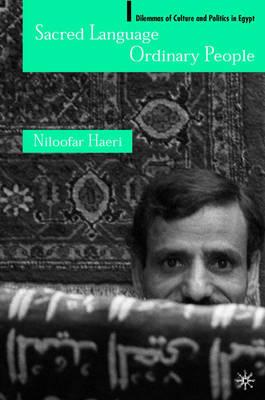Overview
In the Arabic world, Classical Arabic is the language of both religion and the state, and as such is typically the language of formal written communication and publishing. But local Arabic dialects are often significantly different in terms of grammar, lexicon, and pronunciation than Classical Arabic. Such is the case with the Egyptian dialect of Arabic. In this work, Niloofar Haeri looks at the complex interactions of these two dialects of Arabic in everyday life in Egypt, with a particular focus on the political, cultural, and religious struggles to modernize Classical Arabic. Based on extensive fieldwork in Egypt, the book includes analysis of such topics as: the role of Classical Arabic in religious education and everyday religious practice the work of professionals in Egyptian secular publishing, who must adapt and correct the sacred language for profane uses the use of ""sacred"" Classical Arabic in advertising. The book also speaks to contemporary interest in anthropology of the development of multiple modes of modernity and the new interest in the work and cultural of intellectuals.
Full Product Details
Author: N. Haeri
Publisher: Palgrave USA
Imprint: Palgrave Macmillan
Dimensions:
Width: 14.00cm
, Height: 1.60cm
, Length: 21.60cm
Weight: 0.386kg
ISBN: 9780312238988
ISBN 10: 0312238983
Pages: 184
Publication Date: 24 February 2003
Audience:
College/higher education
,
Professional and scholarly
,
Postgraduate, Research & Scholarly
,
Professional & Vocational
Format: Hardback
Publisher's Status: Active
Availability: In Print

This item will be ordered in for you from one of our suppliers. Upon receipt, we will promptly dispatch it out to you. For in store availability, please contact us.
Reviews
'[T]his is one of the most interesting books I have ever read on language. It is certainly unique insofar as the study of Arabic is concerned, for no linguistic ethnography exists for Classical Arabic'. - Steven C. Caton, Professor of Contemporary Arab Studies, Harvard University 'I don't know of anyone who has carved out the subject Haeri is pursuing in such original fashion. She writes clearly about a very complicated set of issues, and she has a wonderful way of blending theory with empirical work'. - Philip S. Khoury, Professor of History, Massachusetts Institute of Technology 'Haeri's fine book explores one of the most fundamental distinctions in human communication systems-formal versus informal-by examining one of the world's most important official languages-Classical Arabic. She shows that understanding the role of formal language in society is crucial to an understanding of the state and its relation to symbolic capital. This subtle and well-written analysis is only possible because Haeri relies on concrete ethnographic data of language in practice for her examples'. - Joel Kuipers, George Washington University, Institute for Ethnographic Research
'[T]his is one of the most interesting books I have ever read on language. It is certainly unique insofar as the study of Arabic is concerned, for no linguistic ethnography exists for Classical Arabic'. - Steven C. Caton, Professor of Contemporary Arab Studies, Harvard University 'I don't know of anyone who has carved out the subject Haeri is pursuing in such original fashion. She writes clearly about a very complicated set of issues, and she has a wonderful way of blending theory with empirical work'. - Philip S. Khoury, Professor of History, Massachusetts Institute of Technology 'Haeri's fine book explores one of the most fundamental distinctions in human communication systems-formal versus informal-by examining one of the world's most important official languages-Classical Arabic. She shows that understanding the role of formal language in society is crucial to an understanding of the state and its relation to symbolic capital. This subtle and well-written analysis is only possible because Haeri relies on concrete ethnographic data of language in practice for her examples'. - Joel Kuipers, George Washington University, Institute for Ethnographic Research
Author Information
NILOOFAR HAERI is Associate Professor in the Department of Anthropology at Johns Hopkins University. She has also been a visiting research scholar at the University of Cairo and held a Bunting Fellowship at the Radcliffe Institute for Advanced Study, Harvard University.




